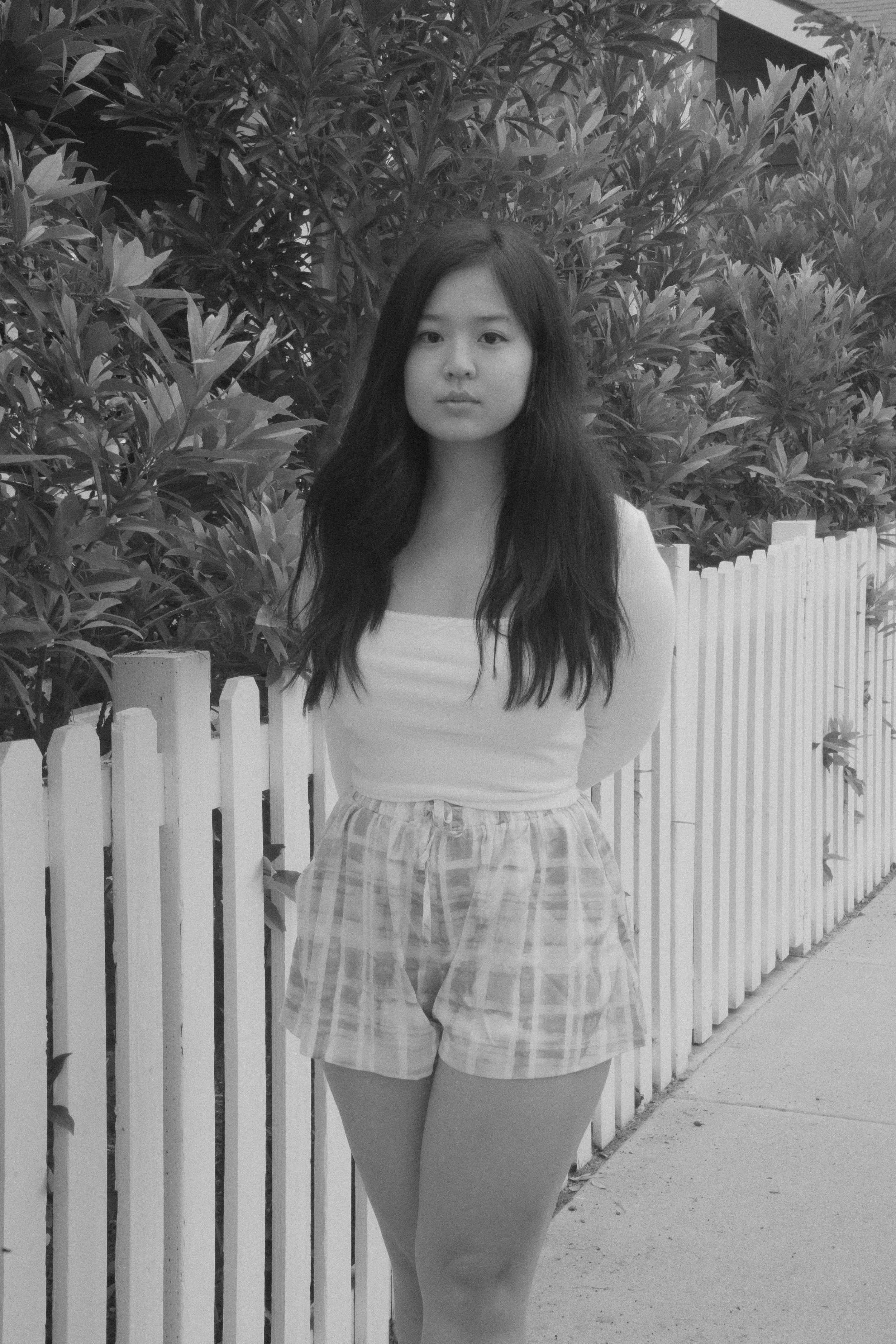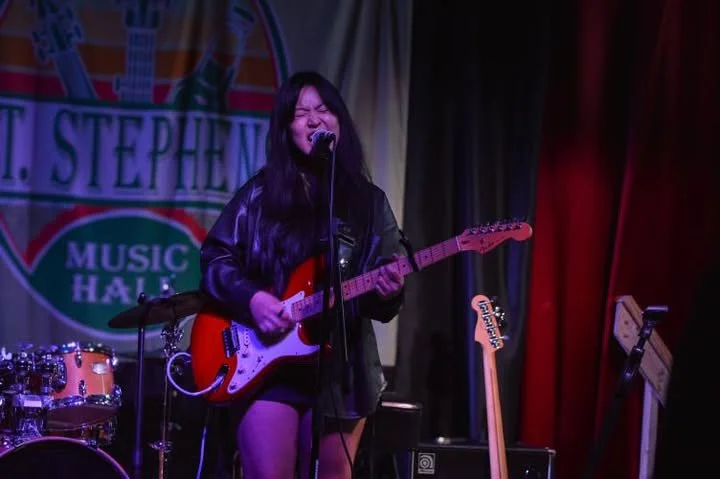Artist Spotlight: Mulan Throneberry
Meet Mulan Throneberry
Yes, Mulan is her real name. Originally from Decatur, Alabama, Mulan draws inspiration from Americana, rock, and the Southern storytelling tradition to craft honest, evocative lyrics about complex societal issues. Her debut album, Nine Lives, chronicles her struggles with love, mental illness, addiction, and loss.
North Alabama Arts: Your name sounds like a fantasy character. Did you ever think about a stage name?
Mulan: I used to just go by Mulan, but that was more difficult because it would get confused with the character so people couldn’t find me. The only thing I’ve thought about is changing the last name because nobody can spell it for some reason. People look at it and always think it’s “Thorneberry.” The idea of going by something different, I feel like I wouldn’t see it as me.
NAA: When did you start playing music?
Mulan: I started playing music when I was four. My dad took guitar lessons, so I would go up to the music studio with him. The owner of the studio asked, “do you want to play piano?” So I started taking piano lessons, was in marching band, started playing guitar when I was 15. And I had been writing songs a couple years before that. Piano was my main instrument of my childhood. Which is funny because I don’t really play piano now.
NAA: When did you start performing?
Mulan: I started playing gigs and stuff when I was 15. I wanted to be like early Taylor Swift. I was very family friendly because I was a kid. Very agreeable. I honestly had an easier time getting three hour bar gigs and stuff than I do now. Not because my public presentation is offensive, but once I got to college, I thought, "I have things to say and it’s never going to be appealing to me to try to fit in.” When I was 15 singing “Our Song” by Taylor Swift, no one was going to have any sort of strong opinion either way.
NAA: What changed?
Mulan: I went to [Middle Tennessee State University]. My original plan was to work in the industry, but the more I learned about it, the more I didn’t want to do that. Ron Pope came to MTSU to do a little panel. He was talking about people who are cult fans of things, how to connect with them you have to be authentic. How I was [playing] before, it was, “I’ve heard of her, she’s nice.” Nobody had anything bad to say either…I think especially once I started to talk about politics and social issues more, it turned some people away. It’s fine because the people who are also fired up about the same things that I am are the people I want listening to my music.
NAA: I can definitely see that in your work. Something that strikes me about your songs is how honest they are. Is it difficult to access that part of yourself in front of other people?
Mulan: It’s definitely difficult. Usually before I go on stage, I say, “I’m not doing this.” No one knows the set list. I could play anything. But when people reach out or they come up to me afterwards, they’ll tell me things that are really similar and I’m like “damn, that sucks for both of us.” But that means I’m doing something right.
NAA: You talk a lot about addiction. What does addiction mean for you?
Mulan: It is a normal part of social life to think, now that I’m 21, I can go to bars and drink. In my early 20’s, I thought, I’m not doing a single thing that 90% of people my age aren’t doing. And that was true. But when I woke up one day and thought, now it’s time to stop, and they could and I couldn’t, that was the difference.
NAA: Do you think people have a different perception about you when you use the word “addict” instead of “alcoholic”?
Mulan: Alcohol is a drug, by definition. A lot of people have trouble admitting that because we look down on drug addicts so much. A lot of people are like, “well, I drink but I don’t want to say I do a drug.” But you do, and that’s ok. If you don’t have a problem with it, it’s fine. It’s even in the phrase, “drugs and alcohol.” Everyone knows someone who they would call an alcoholic. But when you throw the word “addict” in there, well, alcohol kills thousands of people a year.
NAA: So you started out wanting to be like Taylor Swift. Who are your influences now?
Mulan: Jason Isbell, he’s from northern Alabama. I like that he’s proud of that while also critiquing the social issues that are specific to our part of the United States. The other thing that changed things for me is I watched the documentary on Amy Winehouse. That whole Back to Black album has been where a lot of inspiration for music in my adult life has come. And Demi Lovato also. Even before I identified as an addict, I admired it. It’s really hard to tell anyone you struggle with this. Seeing Demi Lovato be so open on not just addiction but bipolar trauma, general misogyny growing up as a woman, eating disorders, that’s really when I thought, well if this is helping me…I’m not gonna sit here and feel bad for myself.
NAA: What are you working on right now?
Mulan: The album [Nine Lives] was something I needed to get out. I didn’t do any of the release plan…I wrote a lot of songs that same week, and I was just recording in my living room. I’d come home from work, drink, and then work on my album. I hit my last track, sent it to the engineer, and I called [my friend] and said, “OK you need to take me to the psych ward.” That was such a dark album, but I’m glad I put it out. I need to collab with the Wiggles or something next. So I’m going to keep promoting that as much as I have the capacity to do. I’m just trying to have fun with it again.
NAA: What’s your favorite song on that album?
Mulan: I think “Drunk Bastard” is my favorite song that I’ve written. I like people’s reaction to it. It sounds like it’s going to be a diss track or poppy—it’s very unexpected, I think. It’s light hearted while also being about really heavy stuff. My merch, also, is kind of tongue-in-cheek. It is a sad and intimate song, but I have stickers that say, “this vehicle stops for drunk bastards.” With my merch and my social media presence and stuff, you have to keep it pretty silly because if you don’t laugh, you’ll cry.
NAA: Going back to performing, what’s your favorite place to play locally?
Mulan: I’m glad they brough the Rocket City Revue back. I’m trying to get into playing house shows more. I started to enjoy going to open mics. I try to do the classic bar gigs. The first place that I ever played at was The Brick [Deli and Tavern] in Decatur, so that one will always be special to me. Because I was 15 and I was not really as good as I thought I was, but they still give me a chance and kept booking me and believed in me. I guess that would be my favorite.
NAA: What do you think about the Huntsville music scene? How could it be improved?
Mulan: I have played shows in a lot of places. I played in Los Angeles and Nashville a lot; they’re the ones I keep coming back to. Musicians in Huntsville monetarily have it very good. I think there is a lot more respect for this is a skill profession rather than “it’s my stage, and if you want to get on it you have to do this.” I do think somewhere Huntsville music could be improved is having more songwriter-oriented, original music-oriented things…I think there should be a place where I can preach to people about what I believe. That’s why I came here.
NAA: And finally, do you have advice for songwriters, from your own experience, about getting over that kind of fear of putting yourself out there?
Mulan: I’m working on it. Don’t listen to me. I used to have all these fake, “when I do this, I made it”—when I hit a certain amount of streams, for example. Then I was playing in Indianapolis at Sofar Sounds. One of the songs I had written was about my experience with suicidal ideation. Someone came up to me afterwards, and she said, “I’m glad you’re talking about that because I lost my husband to suicide.” And then I realized that is one person that’s never going to forget this performance, that’s one person that made me feel heard, but that’s just the one that wanted to come up and say it. So whether you see it or not, you are making an impact on people if you’re authentic about it. She can’t be the only person who’s ever felt like that. Then it didn’t matter the number of streams, for me it’s about the impact. I guess if someone is nervous, just think about that.
This interview was recorded on 08/18/2025.
Listen
Apple Music/Spotify: Mulan Throneberry
Instagram: @mulanthroneberryy
Image Credits: @daphfae (top), @mikailabrookephotography (bottom)


